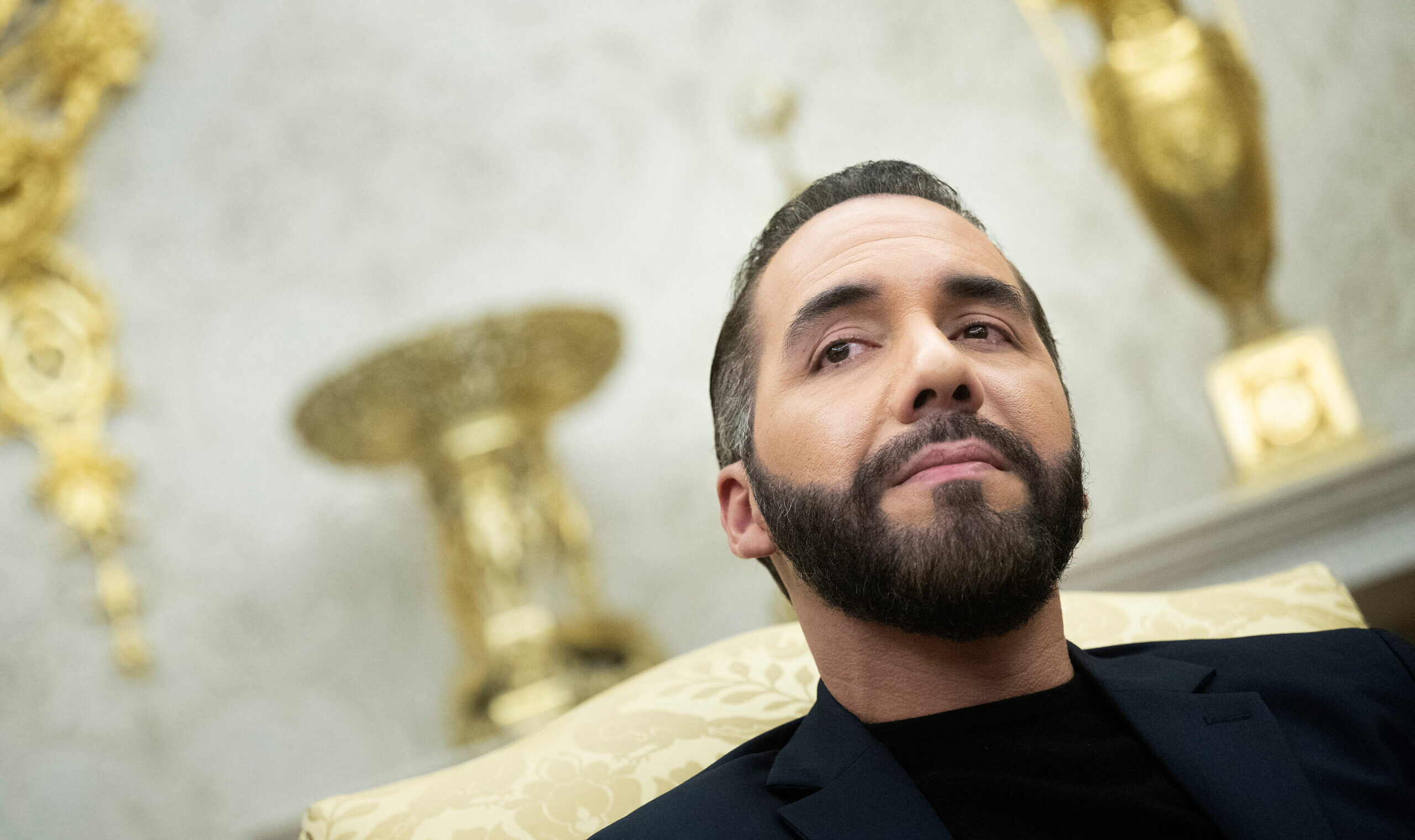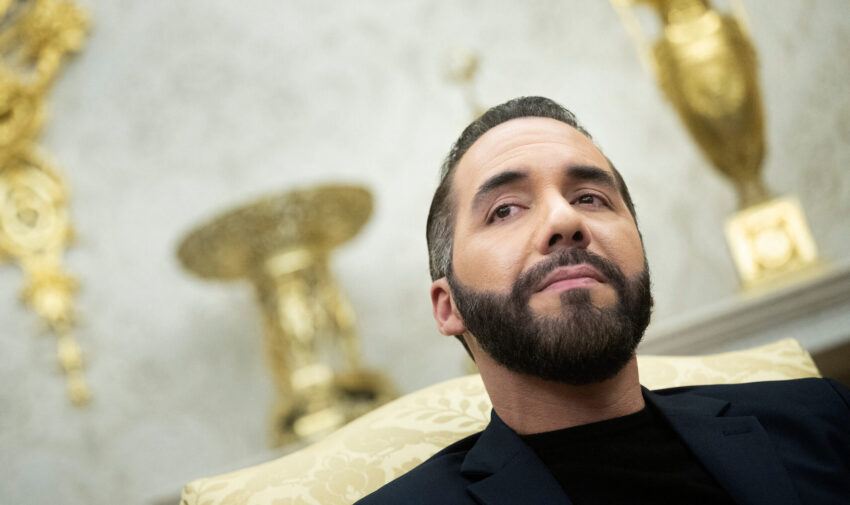Bukele and the Perils of Democratic Authoritarianism
The charismatic president’s success in taming El Salvador’s gangsters does not render him immune to humanity’s common failings.

President Nayib Bukele of El Salvador is one of the most popular politicians in history, and for good reason. During his presidency, Bukele’s tough-on-crime policies remade El Salvador from one of the most violent and unsafe countries in the world into a nation safer than Canada. The change must be shocking to El Salvadorians, most of whom grew up in a country racked by brutal civil war and even more brutal gang violence. The result is popular adulation: Bukele’s approval rating stands somewhere between 85 and 95 percent, depending on the poll—about as close to universal acclaim as one can achieve.
And Bukele has not been shy about taking political advantage of his popularity. On July 31, El Salvador’s national legislature approved an amendment to the country’s constitution ending presidential term limits and extending the term of election from five to six years in office, a move which is transparently intended to facilitate Bukele’s indefinite reelection. When asked about the purpose of the constitutional reform, Congresswoman Ana Figueroa—a member of Bukele’s party Nuevas Ideas—replied that the amendment would provide for “greater stability” and “political and judicial security.” In other words, continued rule by Bukele.
Some political commentators, especially on the left, have taken this as further evidence that Bukele is a dictator and that his presidency is illegitimate. This is the wrong way to think about the issue. Bukele is without a doubt an authoritarian; his government has limited a number of civil rights, including procedural rights during criminal trials. But Bukele’s certain reelection is not the product of some kind of antidemocratic seizure of political power—it is the product of the fact that he is monumentally popular. He is an authoritarian leader, but a democratically-elected authoritarian leader. Indeed, his popularity proceeds from the fact that his authoritarianism has been effective at solving the criminal violence that plagued the country for so many years.
This kind of popular authoritarianism has been a common pattern in Latin America for centuries. The figure of the caudillo has become more obscure as party democracy has become more institutionalized in the region, but Bukele—despite the modern trappings of tech-bro aristocracy—fits the archetype well.
But caudillismo carries with it a number of well-known risks. The popular strongman is often capable of bringing order and stability to his region for a time, as Bukele has done. But no one is immune to the weaknesses and foibles of human nature. Even caudillos that sincerely begin with political principles and the welfare of the public in mind often succumb to the temptations of personalist rule: the easy access to the public treasury and public posts, the capacity to crush dissent and competition, and the ability to artificially prop up one’s rule long after popularity and legitimacy have passed. The results are scattered liberally throughout the history of Latin America: caudillos who become corrupt and nepotistic, who repress legitimate political opposition, and who seize power when their sins have lost them their original public support.
The most obvious historical parallel that comes to mind is that of Alberto Fujimori, the president-cum-dictator of Peru. After a dark-horse campaign unexpectedly elevated him to the presidency of the nation in 1990, Fujimori led Peru from being a nation crushed beneath continual economic decline and a savage communist rebellion to one of peace and relative prosperity. He crushed the Maoist Shining Path rebels in a savage war, conducted a massive liberalizing reform of the economy that ended inflation and precipitated a wave of foreign investment, and in the process conducted a military coup on his own government to dissolve an obstructionary Congress and the courts (a measure which was, at the time, very popular with the Peruvian people).
Like Bukele, Fujimori’s ability to bring order pushed his popularity to staggering heights. By 1995, his approval rating stood at 80 percent. He easily won reelection to a second term, and ran for a third term in 2000. But things were already coming apart for Fujimori. His administration had become massively corrupt, siphoning hundreds of millions of dollars—a significant portion of the state budget—into private pockets. Political skullduggery allowed him to win a third term—likely by stuffing the ballot boxes—but his popularity was gone and his legitimacy had worn thin. When a video was released showing his chief of intelligence and right-hand man handing a congressman a thick envelope of banknotes in return for his vote, it all came crashing down. Fujimori left the country on a “state visit” to Brunei, then fled to Japan and infamously submitted his resignation from the presidency by fax.
This is not to say Bukele will inevitably succumb to the same fate as Fujimori, or any other caudillo. It may be that Bukele has the moral fiber needed to resist the temptations of power and popularity, and thus will serve his country faithfully in his role as president, maintain his popularity, and retire gracefully. But, unfortunately, history instructs us that it would not at all be surprising if Bukele’s political career going forward takes a more sordid turn.
The other major problem facing Bukele is the classic problem that faces dictators, caudillos, and leaders of democratic mass movements alike: succession. However successful Bukele may be going forward, he will not be around forever. Eventually, some other leader will need to take the country’s reins. But this represents a thorny problem, even for capable leaders. Talented young politicians are the material from which successors are made, but they are also the primary threat to political power. A potential successor can easily become a usurper. The result is normally the strongman suppressing all other talents in the political sphere as much and for as long as he is able, a situation that both leads to a succession crisis when the strongman falters or fails, but also deprives the state of effective subordinate leadership.
The best remedy for this is institutionalization, the creation of formal structures that shape political talent, guide it into proper ends, and lead it along whatever cursus honorum has been instituted for political succession at the highest level. The greatest strongmen, like Napoleon Bonaparte, were not just powerful leaders that brought temporary order to their nations; they were great institutionalists as well, providing a systematic and self-perpetuating peace and prosperity capable of enduring even when they themselves had long since returned to the dust.
Unlike Napoleon, who had the institution of monarchy available to him when he picked the crown of France up from the gutter, Bukele cannot easily declare himself King or Emperor and settle his succession hereditarily. Modern peoples have almost universally decided that legitimate government must be democratic, and so Bukele probably must rely on democratic institutions for the continuation of his regime and the selection of a successor.
He does have a political party, Nuevas Ideas, but the party seems largely constructed as an extension of his personal influence. It has little internal structure, apart from his own command, and is unlikely to produce a worthy successor as things currently stand. If El Salvador is to remain stable and well governed post-Bukele, that is something that will need to be remedied, and sooner rather than later.
Bukele has done a great thing for El Salvador, and conservatives in the U.S. have rightly heralded it as an example of what can be accomplished when a government decides to take crime and public order seriously. But it would be unwise for temporary enthusiasms, however merited, to blind us to the lessons of history and the consequences of personalist authoritarian rule, however successful it may be in the moment.
The post Bukele and the Perils of Democratic Authoritarianism appeared first on The American Conservative.
Click this link for the original source of this article.
Author: Joseph Addington
This content is courtesy of, and owned and copyrighted by, http://www.theamericanconservative.com and its author. This content is made available by use of the public RSS feed offered by the host site and is used for educational purposes only. If you are the author or represent the host site and would like this content removed now and in the future, please contact USSANews.com using the email address in the Contact page found in the website menu.








